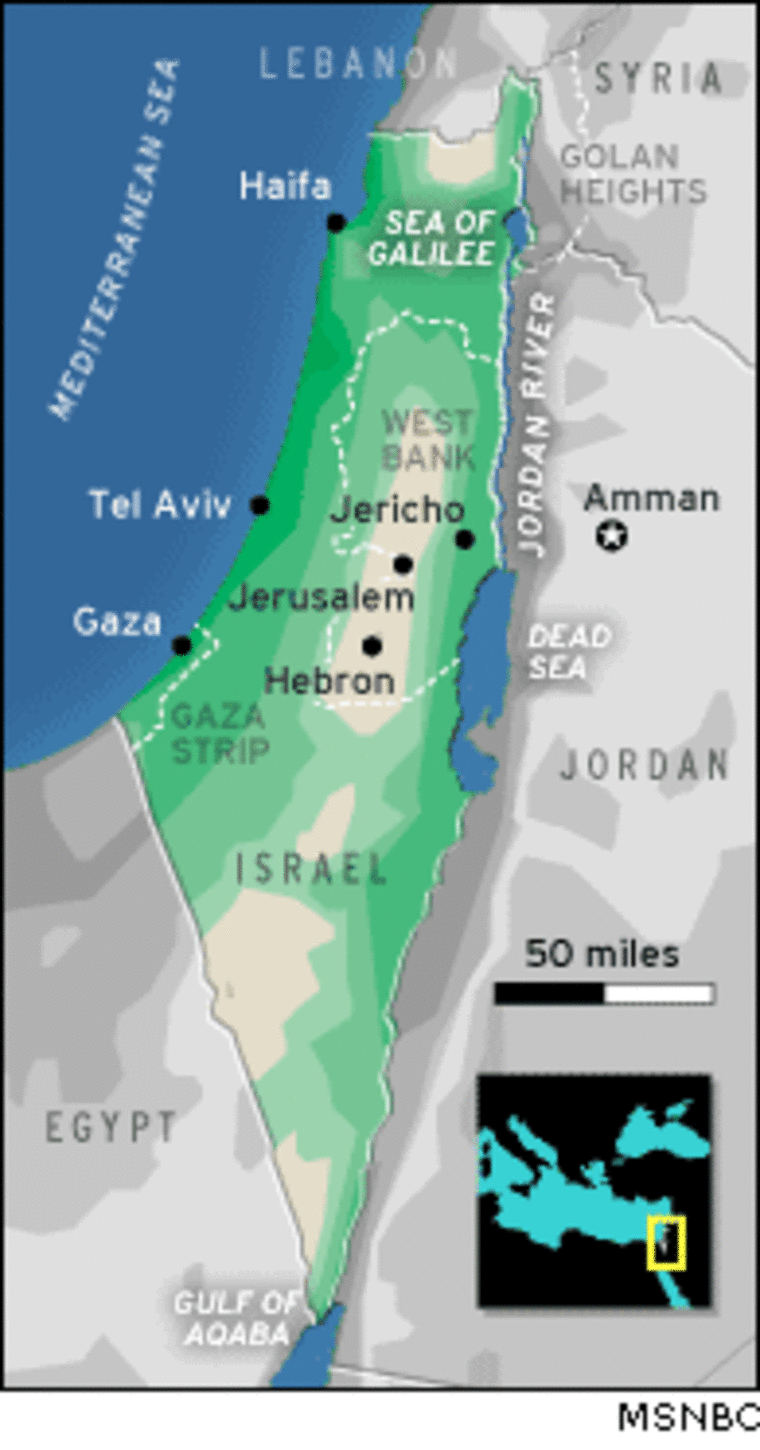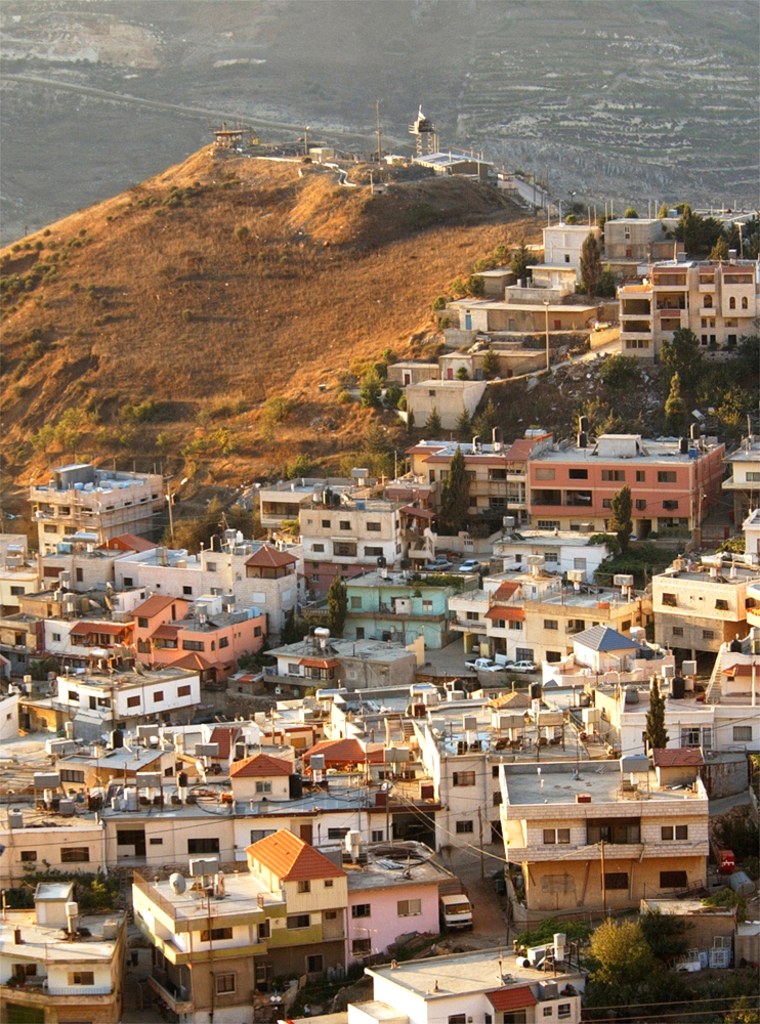Israel intends to double the number of Jewish settlers in the Golan Heights over the next three years to tighten its grip over the plateau seized from Syria in a 1967 war, a cabinet minister said on Wednesday. The announcement came as Israeli officials sparred over the removal of settlers outposts on the West Bank and Gaza Strip.
Syria denounced the announcement.
"There is no recognition for this measure. Israel is deluded that it can achieve something by relying on power and occupation," Syrian Deputy Foreign Minister Isa Daweesh told Reuters.
"Practically, Israel cannot gain anything out of this move because it is not legitimate."
Asked if Israel's move was a step to pre-empt any future peace negotiations between the two countries, Daweesh said: "Conflicts are not resolved through power, they should be resolved under international law."
Protest violence
The Israeli army shot and wounded 10 Palestinians and one Israeli in its second confrontation in five days with protesters opposing a barrier Israel is building inside occupied West Bank territory Palestinians seeks for a state, witnesses said.
Persistent violence has torn the road map to Palestinian statehood in the West Bank and Gaza Strip. Palestinians vowed revenge after Israel botched a bid to kill a militant leader with a missile strike on Monday, wounding 10 passersby instead.

Agriculture Minister Yisrael Katz told Israel Radio the right-wing cabinet had agreed to double the current settler population of 17,000 to solidify its hold over the Golan before opening any peace negotiations with Syria.
Such a move would increase "facts on the ground" -- consolidating Israeli control over captured territory -- similar to the way the barrier slicing through West Bank terrain would incorporate Jewish settlements Prime Minister Ariel Sharon has vowed never to yield under any peace treaty.
Syrian President Bashar al-Assad, like his late long-ruling father Hafez al-Assad, has demanded a total Israeli withdrawal from the Golan in exchange for peace and has urged Washington to help revive talks with Israel that collapsed in early 2000.
"The government decision is a response to the initiative of Syria, which said it is interested in peace while openly supporting Palestinian terror," Katz told Israel's largest daily Yedioth Ahronoth.
Syria denies the Israeli charge, saying Palestinian militant groups with a presence in Damascus have information offices only. Palestinians launched an uprising three years ago in the West Bank and Gaza Strip, lands Israel also occupied in 1967.
Israel conquered the Golan Heights in the 1967 Middle East war and annexed it in 1981, a move condemned internationally. Israel and Syria have no diplomatic relations and remain in a technical state of war.
However, the Golan Heights has been relatively violence free in the past decades, in contrast with the frequent attacks and retaliation from both sides in the West Bank and Gaza Strip.
The Golan is a grassy plateau with important aquifers and strategic value as it overlooks northeastern Israel including the Sea of Galilee, a major tourist draw and water source too.
Right-wing ministers in Israel's cabinet fiercely oppose any negotiations over the territory.
Katz, the plan's initiator and head of the cabinet's settlement committee, told Israel Radio: "It is good for everyone to know that Israel has no intention to loosen its hold on the Golan, but exactly the opposite."
Gaza, West Bank settlements grow
On Tuesday, Israel's Interior Ministry released statistics showing that the population in the Jewish settlements in the West Bank and Gaza Strip has grown by about 16 percent during the almost three years of Prime Minister Ariel Sharon’s rule.
The Israeli statistics show the population of settlements is 236,381 people, up from 203,067 at the end of 2000, three months before Sharon took office.
The Israeli prime minister has traditionally been a champion of settlements established in the areas Israel captured in the 1967 Mideast war.
But in June, Sharon committed to implement the U.S.-backed “road map” peace plan. The plan, stalled by mutual violence, calls for Israel to dismantle all outposts built since March 2001 and freeze construction in 150 larger settlements on land captured from Jordan and Egypt in the 1967 Middle East war.
The road map outlines the establishment of an independent Palestinian state by 2005. Some 3.5 million Palestinians live in the West Bank and Gaza.
The road map also calls on the Palestinians to dismantle militant groups — a move they have so far failed to take.
In a recent policy speech, Sharon said he may dismantle some outlying settlements as part of a unilateral “disengagement” from the Palestinians if progress is not made on the road map. Israel’s announced on Monday a decision to remove four unauthorized settlement outposts.
“The prime minister is determined to fulfil his obligation in terms of personal credibility as well as the credibility of the state of Israel,” Sharon adviser Raanan Gissin told Reuters.
“You are going to see more of this,” he said, referring to the dismantling of unauthorized outposts.
Outlying settlements grew faster
The statistics released Tuesday show that the population in the outlying settlements — which tend to attract Israelis motivated more by ideology than economic benefits — grew faster than those in areas closer to the line with Israel.
For example, the Kfar Darom settlement in the Gaza Strip grew by 52 percent during the past three years. Nearby Netzarim grew by 24 percent. The settlement enclaves in the West Bank city of Hebron, where 130,000 Palestinians live, grew by almost 15 percent to 554 residents, the Interior Ministry said.
In contrast, the settlement of Maaleh Adumim, located just a few minutes drive outside of Jerusalem, grew by nine percent.
An official in Sharon’s office said the prime minister remains committed to the road map. The official, speaking on condition of anonymity, said Sharon has not built new settlements, allowing only “natural growth” in existing settlements.
The overall annual growth rate for the nation is 1.8 percent, Israel’s Army Radio said.
Palestinians skeptical
The Palestinian Authority on Monday criticized Israel’s decision to dismantle four unauthorized outposts, only one of which was inhabited, saying the move was a publicity stunt that falls below the requirements of the U.S.-backed road map.
“I think the world is sick and tired of these public relations stunts -- Israelis moving a caravan here and a caravan there,” Palestinian Negotiating Minister Saeb Erekat told reporters in the West Bank city of Ramallah.
Two members of Prime Minister Ariel Sharon’s cabinet said the Israeli government was moving too slowly in carrying out a commitment to remove dozens of unauthorized settlement outposts from occupied territory.
The ministers spoke on Israel Radio after Sharon signed an order to accelerate the removal of the four outposts -- only one of them inhabited -- in accordance with the road map.
A senior adviser to Sharon said more would be dismantled in the future but gave no date.
Palestinian leader Yasser Arafat appealed to Israel’s security concerns in denouncing the settlement expansion.
“I ask the Israeli side to stop... this settlement assault that will not provide security for the Israelis, because the road to security is through the recognition of our rights,” he said in remarks broadcast on Palestinian television and radio.
"Foot-dragging”
Meir Sheetrit, an Israeli minister without portfolio and member of Sharon’s right-wing Likud party, said the government was dragging its feet on the issue.
Justice Minister Yosef Lapid, leader of Shinui, a key coalition partner, added that the unauthorized outposts were “ruining our relations with the Americans, with Europe” and must be taken down.
In a statement, legislators from the far-right National Union party said the decision to remove unauthorized outposts “tramples democratic values, and we will not agree to the uprooting of Jews from their land.”
But the party, which has seven legislators in the 120-member parliament, gave no indication that it might bolt the coalition over the removal of the outposts.
Most of the international community regards settlements as illegal. Israel disputes this.
Israeli newspaper reports named the outposts earmarked for removal as Ginot Aryeh and Shaked Farm, both near the Palestinian city of Ramallah; Magen David in the Hebron area; and West Bat Ayin near Bethlehem.
Jewish settlers have 10 days to appeal to the Supreme Court against the edict, issued on Sunday.
“We will go to the Supreme Court,” said Geula Hershkovits of Ginot Aryeh, named for her husband who was killed by Palestinian militants in January 2001.
Yossi Sarid, a leading left-wing member of parliament, said that at least two of the encampments had been removed in past operations but settlers had rebuilt them.
